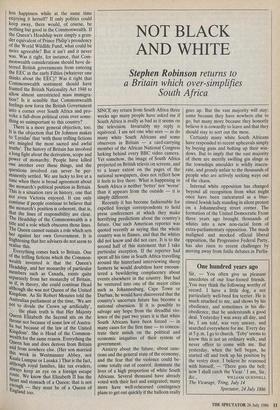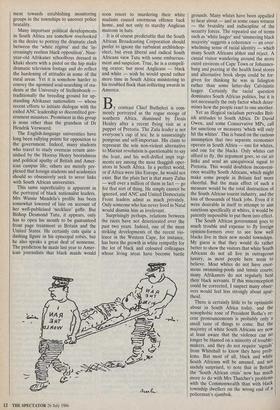NOT BLACK AND WHITE
Stephen Robinson returns to
a Britain which over-simplifies South Africa
SINCE my return from South Africa three weeks ago many people have asked me if South Africa is really as bad as it seems on the television. Invariably my reply is equivocal. I am not one who sees — as do many white South Africans and some observers in Britain — a card-carrying member of the African National Congress lurking behind every BBC video camera. Yet somehow, the image of South Africa projected on British television screens, and to a lesser extent on the pages of the national newspapers, does not reflect how it feels to live there. What is happening in South Africa is neither 'better' nor 'worse' than it appears from the outside — it is simply different. Recently it has become fashionable for expelled foreign correspondents to hold press conferences at which they make horrifying predictions about the country's future. One such American reporter was quoted recently as saying that the whole country was in flames, and that the whites did not know and did not care. It is to the second half of this statement that I take particular exception. If the reporter had spent all his time in South Africa travelling around the hinterland interviewing sheep farmers he would doubtless have encoun- tered a bewildering complacency about events elsewhere in the country. But had he ventured into one of the major cities such as Johannesburg, Cape Town or Durban, he would have discovered that the country's uncertain future has become a national obsession. If it is possible to salvage any hope from the dreadful vio- lence of the past two years it is that white South Africans have been forced — in many cases for the first time — to concen- trate their minds on the political and economic iniquities of their system of government. Anxiety about the future, about sanc- tions and the general state of the economy, and the fear that the violence could be- come totally out of control, dominate the lives of a high proportion of white South Africans. Several thousand have already voted with their feet and emigrated; many more have well-rehearsed contingency plans to get out quickly if the balloon really goes up. But the vast majority will stay: some because they have nowhere else to go, but many more because they honestly believe it is cowardly to leave and that they should stay to sort out the mess.
Certainly many white South Africans have responded to recent upheavals simply by buying guns and bolting up their win- dows. But to imply that the vast majority of them are merrily swilling gin slings as the townships smoulder is wildly inaccu- rate, and grossly unfair to the thousands of people who are actively seeking ways out of the chaos.
Internal white opposition has changed beyond all recognition from what might once have been caricatured as a blue- rinsed Jewish lady standing in silent protest on a Johannesburg street corner. The formation of the United Democratic Front three years ago brought thousands of whites into a new non-racial form of extra-parliamentary opposition. The much maligned and mocked official liberal opposition, the Progressive Federal Party, has also risen to recent challenges by moving away from futile debates in Parlia- ment towards establishing monitoring groups in the townships to uncover police brutality.
Many important political developments in South Africa are somehow overlooked in the desire to portray the dramatic clash between the 'white regime' and the 'in- creasingly restless black opposition'. Nine- year-old Afrikaner schoolboys dressed in khaki shorts with a pistol on the hip make dramatic television footage and do reflect the hardening of attitudes in some of the rural areas. Yet it is somehow harder to convey the agonised soul-searching of stu- dents at the University of Stellenbosch traditionally the breeding ground for up- standing Afrikaner nationalists — whose recent efforts to initiate dialogue with the exiled ANC leadership so discomfited gov- ernment ministers. Prominent in this group is none other than the grandson of Dr Hendrik Verwoerd.
The English-language universities have long been rallying points for opposition to the government. Indeed, many students who travel to study overseas return asto- nished by the Hooray Henry boorishness and political apathy of British and Amer- ican campus life; others are merely per- plexed that foreign students and academics should so obsessively seek to sever links with South African universities.
This same superficiality is apparent in the portrayal of black nationalist leaders. Mrs Winnie Mandela's profile has been somewhat lowered of late on account of her well-publicised 'necklace' gaffe. But Bishop Desmond Tutu, it appears, only has to open his mouth to be guaranteed front page treatment in Britain and the United States. He certainly cuts quite a dashing figure in his episcopal robes, but he also speaks a great deal of nonsense. The prediction he made last year to Amer- ican journalists that black maids would soon resort to murdering their white madams caused enormous offence back home, and not only to starchy Anglican matrons in hats.
It is of course predictable that the South African Broadcasting Corporation should prefer to ignore the turbulent archbishop- elect, but even liberal and radical South Africans view Tutu with some embarrass- ment and suspicion. True, he is a compell- ing orator; but most Anglicans — black and white — wish he would spend rather more time in South Africa ministering to his troubled flock than collecting awards in America.
By contrast Chief Buthelezi is com- monly portrayed as the rogue stooge of southern Africa, dismissed by Denis Healey after a recent flying visit as a puppet of Pretoria. The Zulu leader is not everyone's cup of tea: he is nauseatingly pompous and self-important. His claim to represent the sole non-violent alternative to Marxist revolution is questionable to say the least, and his well-drilled impi regi- ments are among the most thuggish oper- ators in South Africa. In a perfect world, or if Africa were like Europe, he would not exist. But the plain fact is that many Zulus — well over a million of them in fact — go for that sort of thing. He simply cannot be ignored, and ANC and United Democratic Front leaders admit as much privately. Only someone who has never lived in Natal would dismiss him as irrelevant.
Surprisingly perhaps, relations between the races have not deteriorated over the past two years. Indeed, one of the most striking developments of the recent vio- lence in the Western Cape, for instance, has been the growth in white sympathy for the lot of black and coloured colleagues whose living areas have become battle grounds. Many whites have been appalled to hear about — and in some cases witness — the brutality and indiscipline of the security forces. The repeated use of terms such as 'white laager' and 'simmering black majority' suggests a coherence — an over- whelming sense of racial identity — which many South Africans abhor and reject. A casual visitor wandering around the more outré environs of Cape Town or Johannes- burg and peering at the health food stores and alternative book shops could be for- given for thinking he was in Islington rather than some latter-day Calvinistic laager. Certainly the racial question dominates South African politics, but it is not necessarily the only factor which deter- mines how the people react to one another.
Yet an illogical racialism pervades Brit- ish attitudes to South Africa. Dr David Owen, and some Conservative MPs, call for sanctions or measures 'which will only hit the whites'. This is based on the curious assumption that two separate economies operate in South Africa — one for whites, and one for the blacks. Only whites can afford to fly, the argument goes, so cut air links and send an unequivocal signal to Pretoria. This would doubtless inconveni- ence wealthy South Africans, which might make some people in Britain feel more cheerful. But the main effect of such a measure would be the total destruction of the South African tourist industry, and the loss of thousands of black jobs. Even if it were desirable in itself to attempt to aim sanctions specifically at whites, it would be patently impossible to put them into effect.
The South African government goes to much trouble and expense to fly foreign opinion-formers over to see how well blacks live in their new model townships. My guess is that they would do rather better to show the visitors that white South Africans do not all live in outrageous luxury, as most people here seem to believe. Most whites do not have enor- mous swimming-pools and tennis courts; many Afrikaners do not regularly beat their black servants. If this misconception could be corrected, I suspect many obser- vers would feel less strongly about apar- theid.
There is certainly little to be optimistic about in South Africa today, and the xenophobic tone of President Botha's re- cent pronouncements is probably only a small taste of things to come. But the majority of white South Africans are now at least aware that the violence can no longer be blamed on a minority of trouble- makers, and they do not require 'signals' from Whitehall to know they have prob- lems. But most of all, black and white South Africans will be amused, and not unduly surprised, to note that in Britain the 'South African crisis' now has much more to do with Mrs Thatcher's problems with the Commonwealth than with black township dwellers on the wrong end of a policeman's sjambok.



















































 Previous page
Previous page